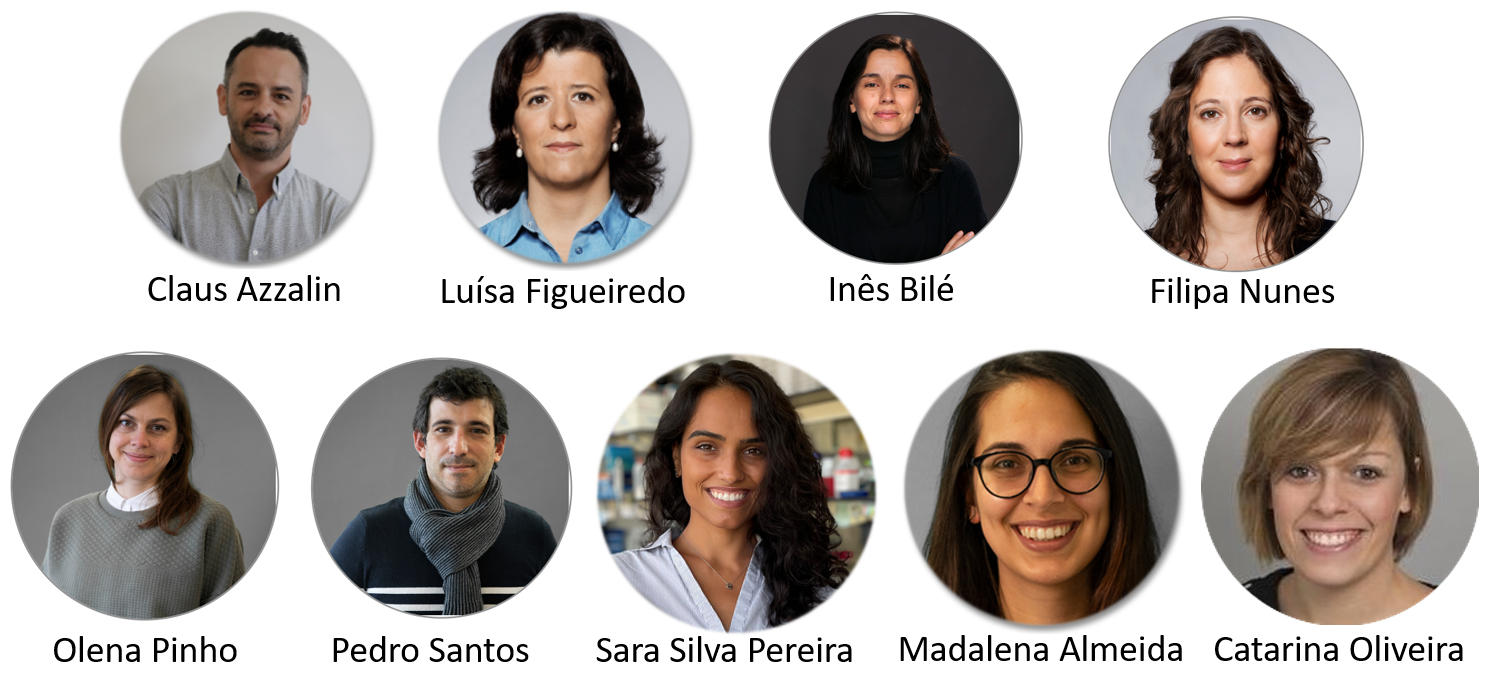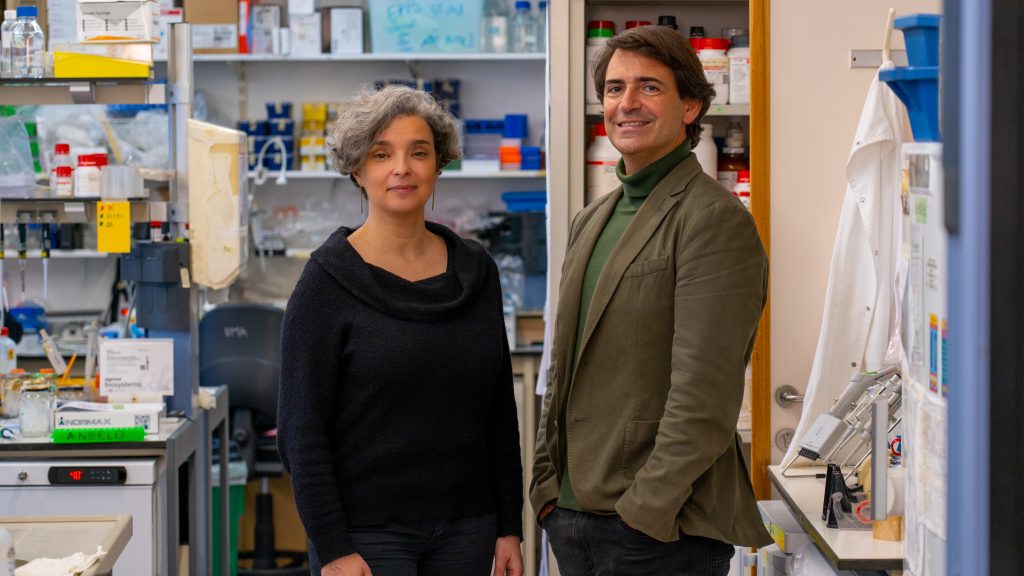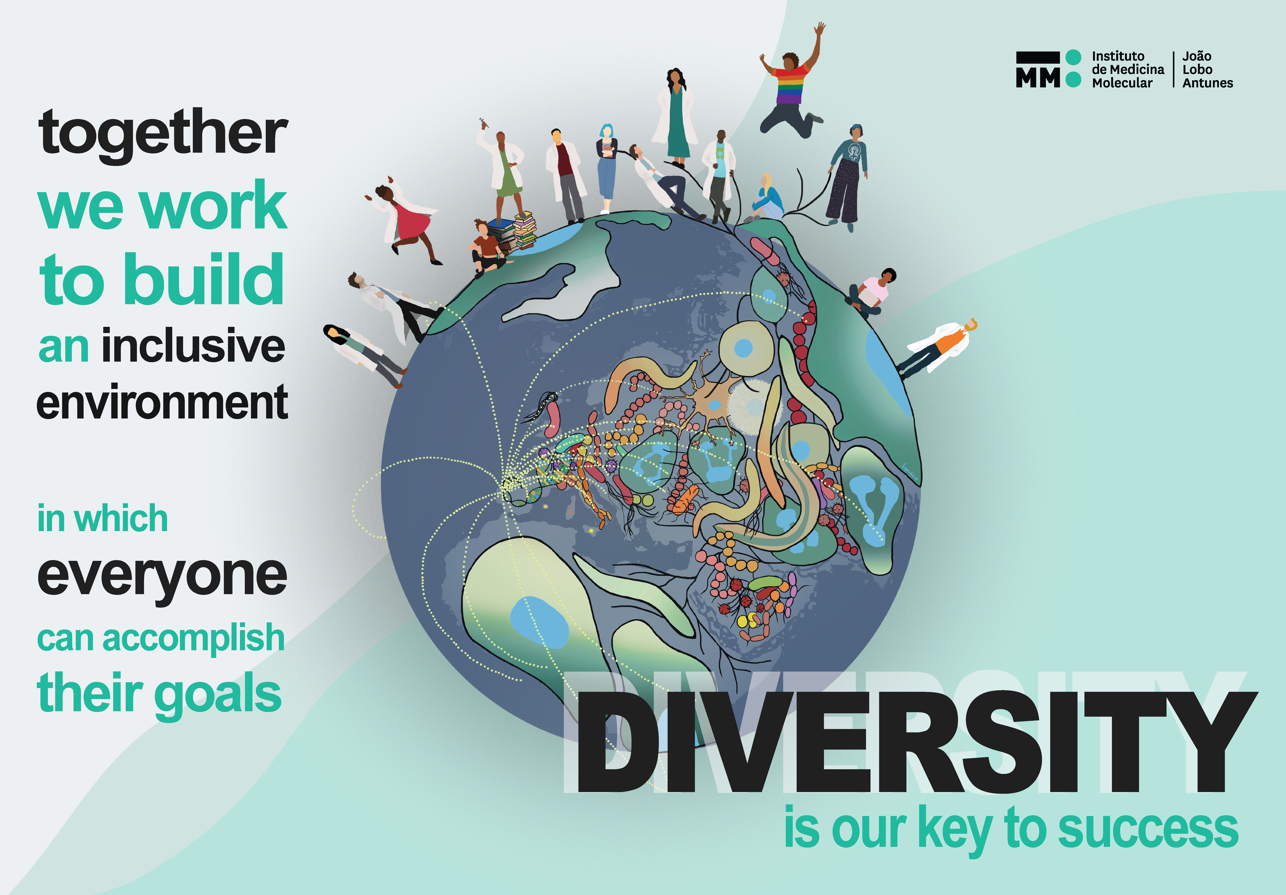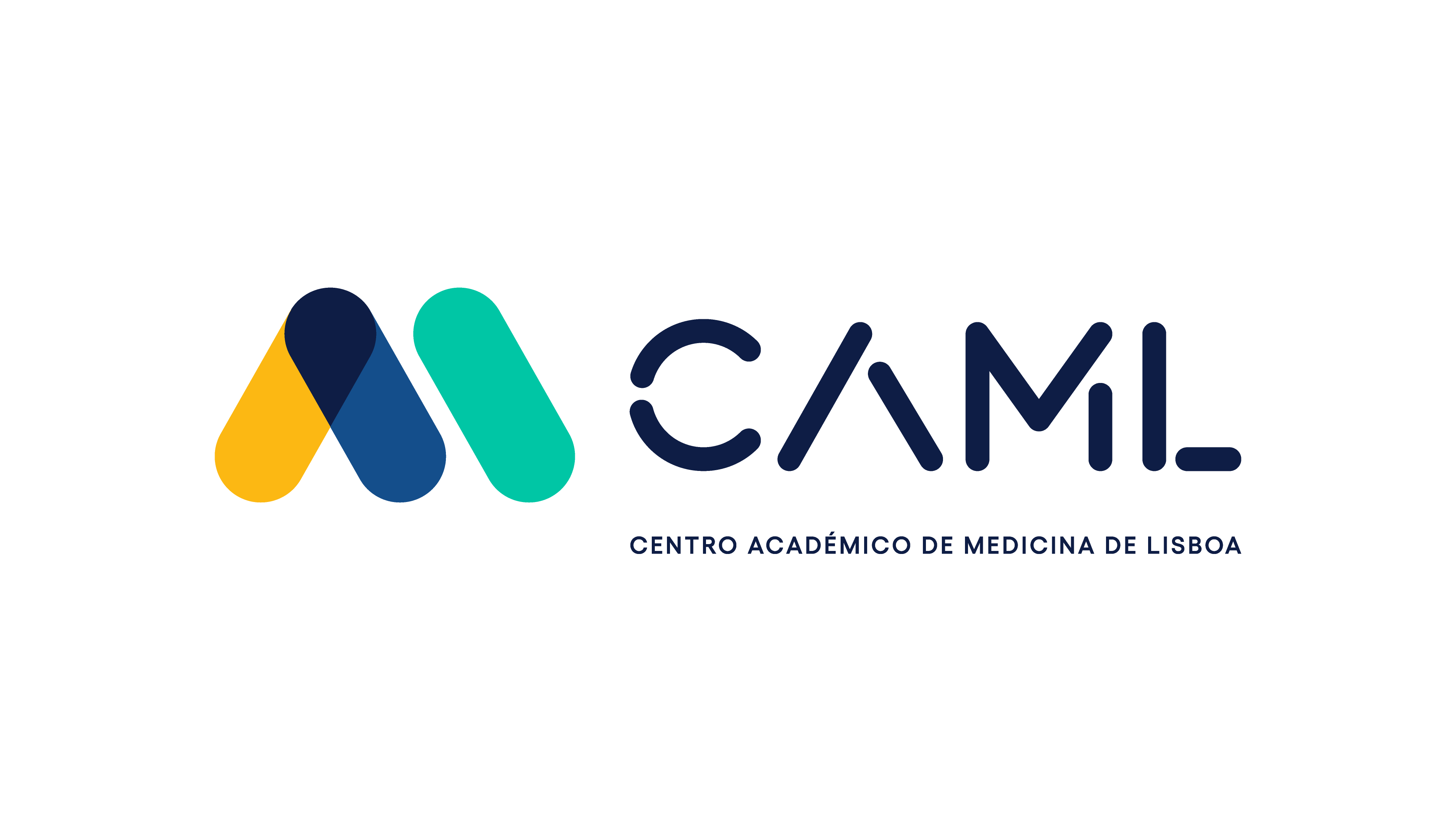A word from the Board
Over the past years, the iMM has become a place where researchers and research supporters, clinicians, and students from all over the world feel welcome and at home. Together, we have created a culture of excellence, innovation, rigor and collaboration that has helped us tackle some of the major challenges in life sciences, health and disease.
We are thrilled to report that 2022 was a remarkable year for the iMM community. Following a couple of gloomy (due to COVID-19) years, 2022 was met with great enthusiasm by iMMers. Labs were bustling once again, masks were removed, social interactions resumed, the cafeteria (re)opened its doors.… and above all, science thrived as many discoveries were made.
Among some of the advances highlighted ahead, Sérgio de Almeida’s team identified a new mechanism that regulates gene expression in cells, crucial for defining a cell's type and function. Luísa Figueiredo’s group made a groundbreaking discovery on mRNA stability, with implications for RNA-based prophylactic and therapeutic strategies. And Cláudia Faria and colleagues created a library of tumor brain metastases models that mimic the disease in humans, providing new approaches for drug discovery and therapeutics.
We also enjoyed time together again. The year was certainly marked by an amazing retreat that joined 320 iMMers and our Scientific Advisory Board at Costa da Caparica to celebrate our science and discoveries. Moreover, the 2nd COLife Community Meeting took place at Forte S. Julião da Barra in Oeiras and, in a stimulating environment, 260 members of 5 distinct research institutions in the Lisbon-Oeiras area showed being eager to share experiences and know-how.
As we must also prepare for future discoveries, one of the most notable achievements of 2022 was the success of our group leaders Luís Graça and Cláudio Franco in securing la Caixa Health Research grants. These bring up to 11 the total number of such grants based at iMM, a testament to our research's quality and impact. We are also delighted that João Barata and senior post-doc Ana Rita Fragoso received a Proof of Concept Grant from the European Research Council to explore the potential of a microRNA-based targeted therapy for cancer.
In addition to these external funding successes, we were delighted to reintroduce our intramural scheme, “BIG – Breakthrough Idea Grant”, which awarded institutional funds to 3 projects, led by Sérgio Almeida and Edgar Gomes; Leonor Saúde; and Luísa Figueiredo and Claus Azzalin. These projects exemplify the innovative and collaborative spirit of the iMM community and have the potential to make a real impact on human health.
In 2022 we also celebrated the work of our trainees at all levels. We were thrilled to present the annual awards for the best Master and PhD theses, and also – for the first time – a new award directed at post-doctoral fellows. These awards are a tribute to the dedication and hard work of our trainees and their mentors, and we are delighted to support the next generation of scientific leaders. We have also been preparing to establish and be in much closer contact with our alumni. Thus, in 2022 we officially founded the iMM Alumni Community, spread across 25 countries on all five continents, to provide valuable inputs and feedback on the impact of our programs and to promote international networking.
And we could not have finished the year in a better way: in December we received the news of our “Teaming” proposal being approved by the European Commission! This ambitious project will allow us to implement the full vision we have for iMM, in collaboration with our key partners at the Vall d’ Hebron Institute of Research (VHIR). Our goal for iMM-CARE is to achieve excellence in clinical and translational research with a mission-driven, human-centred, data-driven research and innovation (R&I) model as a new way to engage all stakeholders – citizens, patients, healthcare professionals, scientists, entrepreneurs, industry, health authorities and government – in interdisciplinary, cross-sectoral collaborations to solve pressing health challenges. And these news came just in time to be celebrated in a wonderful Christmas (or whatever you want to call it) party, which once again took place at “Ferroviário”, and provided many unforgettable moments like the winning video of the now traditional challenge).
As we look ahead into 2023 and beyond, we are confident that iMM will continue to be a vibrant and dynamic home for research excellence, innovation, and collaboration. We are excited to see what the future holds for our community, and we look forward to welcoming new members to our scientific family.
Thank you for your continued support, dedication, and enthusiasm for the iMM!
Maria Manuel Mota (Executive Director) and Bruno Silva-Santos (Vice-Director)
Vibrant Scientific Environment
The iMM – Instituto de Medicina Molecular João Lobo Antunes is a leading Portuguese private non-profit research institute that offers a vibrant scientific environment, aiming to nurture innovative ideas in basic, clinical and translational biomedical research.
Created in 2002, iMM has established itself as a leading national and internationally competitive biomedical institute. Its strategy has been defined by promotion of excellence, leveraged by high-quality human resources, increasing expenditure in infrastructures and knowledge transfer to the society. iMM is an inclusive, equal opportunity employer offering attractive conditions and benefits.
Projects | UIDP/BIM/50005/2020
Projects | UIDB/BIM/50005/2020
Projects | Concurso 02/SAICT/2017
Projects | Concurso 03/SAICT/2015
Projects | UID/BIM/50005/2013 - LISBOA-01-0145-FEDER-007391
Projects | PTDC/MED-ONC/30436/2017
Projects | PTDC/BIM-ONC/7121/2014


Vision, Mission & Values
Our Goal:
To pave the way for groundbreaking science.
Our Vision:
To improve human life through excellence in biomedical research.
Our Mission:
- To promote basic biomedical, clinical, translational and innovation research in these areas, with the aim of contributing to a better understanding of disease mechanisms, to develop new diagnostic or predictive tests as well as new therapies.
- To support postgraduate scientific training of young graduates, doctors and other health professionals.
- To support scientific dissemination and the provision of services abroad in the areas of specialized diagnosis, quality control and collaboration in National and International Commissions related to Health.
Our Values:
Generation of knowledge, excellence, individual freedom and ambition.
Organization & Structure
iMM Associated Members
- Universidade de Lisboa
- Faculdade de Medicina da Universidade de Lisboa
- Centro Hospitalar Universitário Lisboa Norte - Hospital Santa Maria
- Associação para a Investigação e o Desenvolvimento da Faculdade de Medicina
- Fundação Oriente
Boards of Trustees
The Board of Trustees is composed by representatives of the Associated Members and meets at least once per year to analyze the scientific and finance report and to approve the plan of activities and budget for the next year.
Board of Directors
The Board of Directors is responsible for the management of the Institute according to the Plans aprooved by the Trustees. The Board of Directors is elected by the Trustees.
M. Carmo-Fonseca
MD, PhD - President
Maria M. Mota
PhD - Executive Director
Bruno Silva-Santos
PhD - Vice-Director
For any topic related to iMM Board of Directors or iMM President, please contact:
- Clara Artur (Assistant to the Board of Directors)
clara.artur@medicina.ulisboa.pt
- Patricia Cucio (Assistant to the President)
pcucio@medicina.ulisboa.pt
Finance and Operations Director
Fausto Lopo de Carvalho
Scientific Advisory Council
Undertake periodic evaluations to the iMM specific programes and include international experts of scientific fields.
Carlos Caldas
MD, PhD, Chairman
Cancer Research UK Cambridge Institute
Cambridge Cancer Center, UK
Caetano Reis e Sousa
PhD
Francis Crick Institute, London, UK
Elaine Mardis
PhD
Institute for Genomic Medicine at NationWide Children's Hospital, USA
Yasmine Belkaid
PhD
National Institutes of Health, USA
Societal Advisory Board
António Barreto
Chairman
Sociologist and Columnist
Graça Franco
Renascença Group
Paula Martinho da Silva
Lawyer
Diogo Lucena
NOVA School of Business and Economics
João Filipe Queiró
Faculdade de Ciências e Tecnologia da Universidade de Coimbra
Henrique Leitão
Faculdade de Ciências da Universidade de Lisboa
Pedro Norton
Finerge
Domítilia dos Santos
The dos Santos Group
Industrial Advisory Board
Aid the Techonology Transfer Office team in the definition of a strategy and action plan to drive innovation at iMM.
Daniela Couto
Biogeneration Ventures Fund
David Malta
Vesalius Biocapital
Isabel Ferreira
Versameb
Miguel Forte
Zelluna Immunotherapy
Pascale Redig
Janssen
Quality Policy for Research Infrastructure
- Support Instituto de Medicina Molecular João Lobo Antunes (iMM) Researchers to successfully pursue their missions.
- Identify the needs for improvement in the technical, logistics and administrative areas in order to satisfy the needs/expectations of Customers, and promote the necessary measures to solve the difficulties that arise during the course of their activity.
- To promote interaction between the scientific community of iMM and its different social partners, including academic institutions and health and industry, to foster scientific development.
- Comply with requirements and improve the effectiveness of the Quality Management System.
Institutional Policies
Financial Conflict of Interest Policy
The U.S. federal regulation for managing Financial Conflicts of Interest (FCOI) aims to promote objectivity in research by establishing standards for the design, conduct, or reporting of US-funded research so that it will be free from bias resulting from any Investigator’s conflicting financial interest. Instituto de Medicina Molecular João Lobo Antunes (iMM), being an institution with US-funded research, maintains an up-to-date, written, and enforced FCOI policy for managing financial conflicts of interest that complies with the US regulation.
iMM’s FCOI policy can be downloaded here.
Animal Research Transparency Statement
The Instituto de Medicina Molecular João Lobo Antunes is a signatory of the Transparency Agreement on Animal Research in Portugal. This is an initiative supported by the scientific community in collaboration with the European Animal Research Association (EARA) to promote openness and transparency about the use of animals in biomedical research across the country.
Animal research plays an essential role in the knowledge of the biological mechanisms that are involved in diseases and in the development of treatments and new therapeutics for humans and animals. Without the use of animals in research most of the medicines, antibiotics, vaccines and surgical techniques that are applied in human and veterinary medicine would not exist.
Translating scientific discoveries to clinical applications and, ultimately, to public health improvements, is the main goal of Biomedical research. To achieve physiologically relevant results, a part of the scientific work developed in the Instituto de Medicina Molecular João Lobo Antunes and that contributes to the improvement of the biomedical field is thanks to the use of animals in research (rodents, Zebrafish and Drosophila). The use of animals advances our scientists’ understanding of several human diseases such as cancer, malaria, Alzheimer’s, Parkinson’s, and autoimmune diseases, and contributes to the development of novel treatments.
The welfare of animals used in research is a fundamental issue and the research carried on here strictly respects the Portuguese (Decree-Law no. 113/2013 of the 7th of August) and the European regulations (Directive 2010/63/EU) that rule the use of animals in research.
The humane use of animals in the research performed at our institution complies with legal standards and is reviewed by an animal welfare body which promotes the principles of the 3Rs (Replacement, Reduction and Refinement). There is no research project that requires the use of animals taking place without the necessary animal welfare and ethical evaluation and final authorization by the competent authority. It is also ensured that both the animal care personnel and the researchers involved in experimentation have the necessary training and knowledge to perform research with animals.
Gender Equality Plan 2022-2025
The Instituto de Medicina Molecular João Lobo Antunes (iMM) promotes creativity, ambition and freedom as its core values. An integral part of these values is a lasting commitment to equality, diversity and inclusion, which we aim to further strengthen by directing appropriate resources and providing dedicated training to our community.
The aim of the iMM Gender Equality Plan 2022-2025 is to promote equal participation of women, men, transgender and non-binary employees, identifying and eliminating any stereotype or barrier that impedes anyone from developing their best selves in the professional life at the iMM. A set of goals and comprehensive measures was defined for each of five thematic areas:
- Gender equality in recruitment and career progression;
- Gender balance in leadership and decision-making;
- Prevention of gender-based and sexual harassment;
- Integration of the gender dimension into research content;
- Work-life balance;
- Organisational communication and culture.
Find here the iMM Gender Equality Plan 2022-2025.
Equity, Diversity & Inclusion Group
The Instituto de Medicina Molecular João Lobo Antunes promotes creativity, ambition and freedom as its core values. An integral part of these values is a lasting commitment to equity, diversity and inclusion, which we aim to further strengthen by directing appropriate resources and providing dedicated training to our community.
The mission of Equity, Diversity & Inclusion (EDI) group is to identify, raise awareness and implement policies on Diversity and Inclusion issues. Ultimately, our goal is to make iMM an institution where no one is disadvantaged because of their characteristics.
Who we are?

You can reach us at imm-diversity@medicina.ulisboa.pt
Find here the iMM Gender Equality Plan 2022-2025.
iMM Alumni Community
Scientific Reports & Highlights
2024
2023
2022
2021
2020
2019
High quality versions are available upon request - imm-communication@medicina.ulisboa.pt
2018
2017
2016
2015
2014
2013
2012
2011
2010
2009
CAML - Lisbon Academic Medical Center
The Lisbon Academic Medical Center (Centro Académico de Medicina de Lisboa-CAML) is an innovative academic centre and a consortium of three institutions: Centro Hospitalar Universitário Lisboa Norte-CHULN, one of the main portuguese hospitals; Faculdade de Medicina da Universidade de Lisboa-FMUL, the largest national Medical School; and Instituto de Medicina Molecular João Lobo Antunes-iMM, a biomedical research institute of excellence.
CHULN, FMUL and iMM are recognized externally for their strengths in their own domains. By joining efforts, CAML will attain a higher level of international recognition for excellence in healthcare and biomedical research and education.


